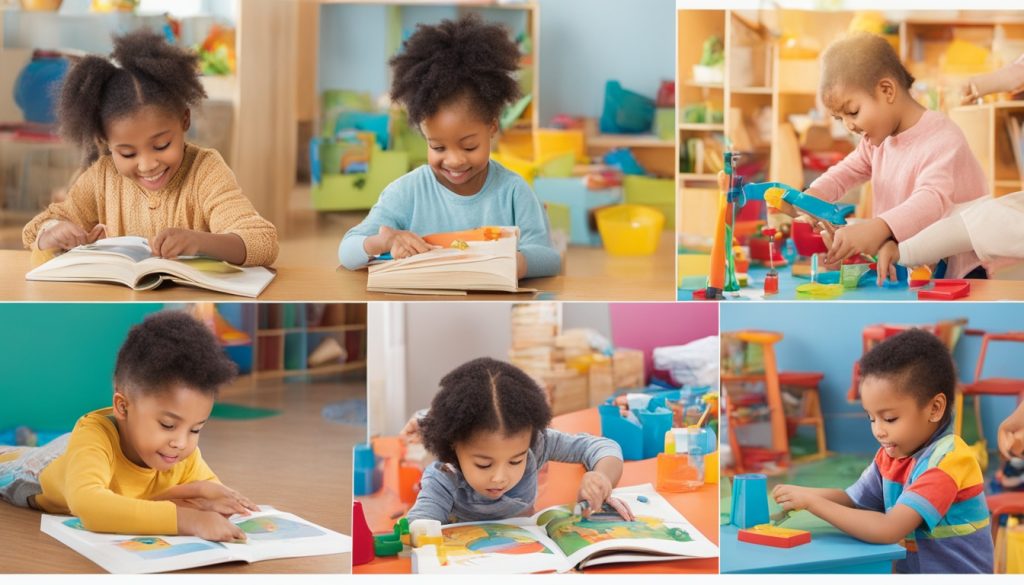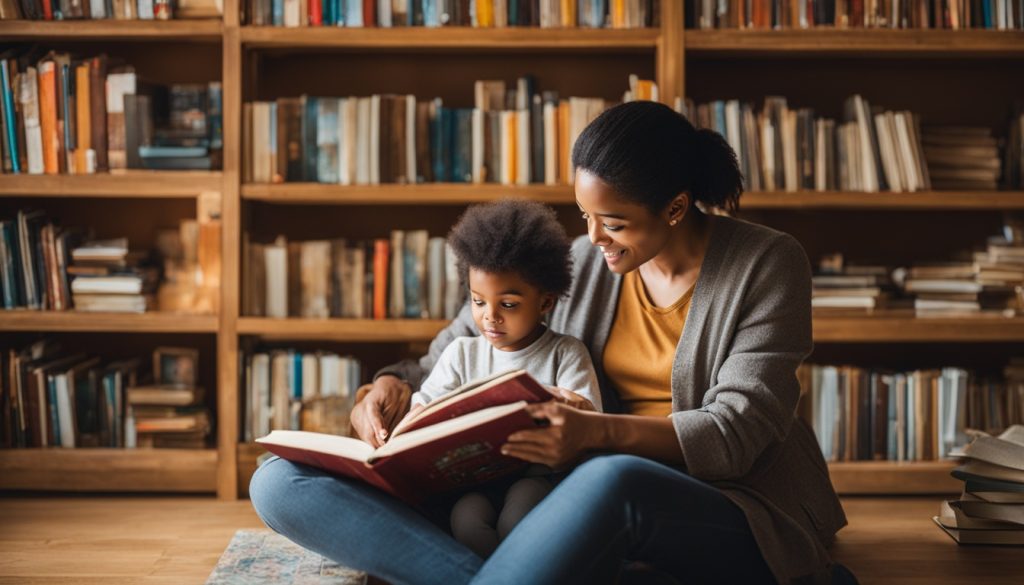Remember when your child’s eyes sparkled as they discovered something new? Maybe it was a butterfly’s wings, the sound of their first piano note, or the joy of a story in a book. These moments are more than just sweet memories. They are the start of a lifelong love for learning and growth.
In today’s fast-changing world, making sure your kids keep learning is crucial. Lifelong learning is more than just school. It’s about always seeking new knowledge, skills, and personal growth.
Studies show that lifelong learning is good for the brain, boosts confidence, and helps with making friends. By teaching your kids to keep learning, you’re giving them the tools to handle life’s challenges. They’ll have better job chances, talk better, and know more words.
This is all thanks to asking open-ended questions that make them think deeply. Answering these questions takes time, so be patient. It’s important to let them explore and learn at their own pace.
Key Takeaways
- Lifelong learning helps kids become adaptable, resilient, and independent.
- Talking with your kids in meaningful ways helps them with words and talking skills.
- Asking open-ended questions encourages critical thinking and exploring.
- Patience is key; answering a child’s question may take up to 60 seconds.
- Introducing reading early helps with reading skills and social skills later on.
Understanding Lifelong Learning
Lifelong learning means always seeking knowledge for personal or work reasons. It helps people adapt to a changing world. Starting early, it shapes how kids grow, think, and be creative.

Definition and Importance
Lifelong learning goes beyond school. It’s about gaining skills and insights all through life. It boosts emotional smarts in kids, making them open to new ideas.
- Homeschooled kids often keep learning on their own.
- Those who love learning grow their skills more than others.
- They welcome new ideas, helping them adjust to changes.
- They learn to bounce back from failures.
Benefits of Lifelong Learning for Children
| Benefit | Description |
|---|---|
| Enhanced Creativity | Learning over time boosts creative thinking in kids. |
| Improved Mental Health | Diverse learning helps kids stay emotionally healthy. |
| Higher Academic Success | Kids who love learning do better in school. |
| Better Overall Well-being | Being a lifelong learner leads to a fulfilling life. |
Encouraging your child to keep learning helps them reach important milestones. It prepares them for the future, supports their school success, and helps them make a positive impact. Through ongoing learning and creativity, they grow intellectually and personally.
Creating a Curiosity-Driven Environment
Creating a space that sparks curiosity is key for kids to be independent and creative. Kids need a place where they can safely explore, ask questions, and find what they love.

Encouraging Questions and Exploration
Encouraging kids to ask questions and explore helps build their confidence. Research shows that boredom is a big problem for kids, making curiosity vital to solve this. When kids are driven to learn and explore, they keep wanting to know the reasons behind things.
This curiosity helps them behave better, making them less self-centered, entitled, or focused on material things.
Dr. Bruce Perry notes that fear, disapproval, and being left out can stop a child’s curiosity. By making a space that encourages kids to follow their interests, we help them develop a deep curiosity. This leads to a love for learning that lasts a lifetime.
Fostering Intrinsic Motivation
Intrinsic motivation is key to sparking creativity in kids. When kids enjoy learning for its own sake, not just for rewards, they learn more. The Curiosity Approach® is a modern teaching method that helps kids use their natural learning abilities. It does this by avoiding too much stimulation and giving them time to think, play, and create.
For infants and toddlers, exploring is crucial. They need environments full of different textures, smells, and sounds. Early Childhood Educators stress the need for these rich environments to spark curiosity from the start.
This approach leads to better school performance, stronger relationships, and overall happiness. It shows how crucial curiosity is in building confidence in kids.
Be a Role Model
As parents, you have a big impact on your child’s views, values, and actions. Showing your love for learning and sharing your own learning stories is key to positive parenting. Being a good role model can really help your child grow and want to learn more.
Demonstrating Your Own Passion for Learning
Children look up to those they admire. By showing your excitement for learning new things, you’re telling your kids it’s cool to do the same. You could talk about the books you’re reading, new skills you’re learning, or the hurdles you’re jumping over.
This shows your kids how much learning matters to you. It makes your parent-child bond stronger and creates a home where curiosity and learning are valued.

Sharing Personal Learning Experiences
Telling your kids about your own learning adventures can help them love learning too. Share the lessons you’ve learned from both wins and losses. This makes you more relatable to your kids and helps build strong parent-child communication.
Talking about how you handle stress or deal with career setbacks can teach them important life skills. Also, sharing how things like crafting, reading for fun, or learning new languages have made your life better can motivate your kids to try them out too.
Promoting Critical Thinking Skills
Teaching kids to think critically is key for their future. It helps them handle life’s ups and downs and make smart choices. By learning to analyze information and ask good questions, they gain big advantages in many areas.

Analyzing Information
It’s crucial for kids to learn to analyze information well. This starts by checking if sources are trustworthy. By doubting what they read, they can tell facts from opinions, which is super important today with all the false info out there. Parents can help by encouraging this habit and supporting a growth mindset for kids.
Letting kids figure out problems on their own helps them think better. Encouraging them to see things from different angles and find various solutions helps them think more widely. Instead of just giving answers, parents can guide them to think it through step by step.
Asking Thought-Provoking Questions
Encouraging kids to ask open-ended questions is a great way to boost critical thinking. These questions make them think deeply and be curious. For instance, instead of “Did you have a good day?”, ask “What was the most interesting part of your day and why?” This not only helps them think better but also makes them more resilient, letting them see different sides and form their own views.
Edtech platforms are a great tool for this. They offer fun activities that challenge kids to solve problems and make choices, improving their critical thinking. Games and simulations on these platforms let kids try things out, make mistakes, and learn from them. This boosts their ability to solve problems and make decisions.
Parents should show kids what critical thinking looks like by questioning their own beliefs and embracing a growth mindset for kids. This not only teaches them but also strengthens their trust in you.
| Benefits of Critical Thinking | Examples |
|---|---|
| Better communication | Children can articulate their thoughts clearly |
| Improved decision-making | Weighing pros and cons effectively |
| Healthy relationships | Emotional intelligence in interactions |
| Strong individuality | Developing a unique viewpoint |
Support Self-Directed Learning
Helping your kids learn on their own builds their independence and boosts their drive. By giving them tools and experiences that match their interests, you help grow their creativity and confidence. This way, they go beyond regular school, exploring what they love and wonder about.
Providing Resources for Independent Learning
Giving kids the right tools for learning on their own can really help them follow their interests by themselves. Give them books, educational stuff, and online sites made for kids. These can turn their screen time into something fun and useful, following top tips for managing screen time well.
Adding activities that kids can do by themselves helps them learn important life skills. Research shows that skills like focus, self-control, solving problems, and talking well are key for kids’ happiness and strength.
When kids feel bored, making a list of things to do is a good idea. This list can have hobbies, projects to explore, or simple creative tasks. Doing this helps kids learn on their own, supports their mental health, and teaches them new ways to learn.
It’s important for parents to manage screen time well as kids learn on their own. A balanced approach lets kids enjoy digital activities without harming their mental health or school work.
Helping kids learn by themselves means giving them what they need and letting them explore. This kind of support helps them grow into confident, strong, and curious learners for life.
Encouraging Creativity
Creativity in children can be sparked by new ways of doing art and playing. Using toys and tools that let them think freely helps them explore their imagination and talents.
Unconventional Approaches to Art and Play
Traditional methods don’t always spark children’s full creative potential. Trying new things like abstract painting, nature crafts, or odd mediums can open up their creativity. Research shows that kids who try different activities and toys find their creative strengths better.
Parents who support their kids’ creative efforts and accept failure help them grow more independent. This support boosts their creative hobbies too.
Using Open-Ended Toys and Tools
Open-ended toys like building blocks, science kits, and art supplies are great for creative play. They let kids tell their own stories and explore their creativity. Studies reveal that parents who encourage their kids’ creative efforts see more originality in their work.
Outdoor play adds to these benefits. It lets kids solve problems and understand the world better. This helps grow their creativity and independence.
Traveling and experiencing new cultures also boosts creativity and social skills in kids. Teaching kids to see mistakes as chances to learn makes them more confident and curious. In short, supporting their hobbies and outdoor play helps them be more independent and creative.
Teach Problem-Solving and Decision-Making
Teaching kids how to solve problems and make decisions is key for their success. By letting your child deal with sibling rivalry, you show them how to handle challenges. This also makes your home a place where everyone feels important.
Teaching kids responsibility means letting them tackle challenges and make their own choices. This helps them think on their own and develop critical thinking. Here are steps for effective problem-solving:
- Define the problem at hand clearly.
- Clarify everyone’s wants and needs regarding the issue.
- Brainstorm potential solutions together.
- Evaluate the options and select the best solution.
- Implement the chosen solution.
- Review its effectiveness and make necessary adjustments.
Getting kids involved in solving problems boosts their confidence. About 80% of kids who make decisions with guidance feel more confident. Talking about the results of their choices helps them understand responsibility and empathy.
| Statistic | Percentage |
|---|---|
| Improved self-confidence from decision-making | 80% |
| Empathy and thoughtfulness from decision-making involvement | 65% |
| Decisiveness and analytical thinking skills in adulthood | 70% |
| Understanding of consequences and empathy | 75% |
| Development of negotiating and compromising skills in teens | 60% |
| Learning from mistakes and building confidence | 85% |
Getting kids involved in solving problems can make family life better. It helps in dealing with sibling rivalry. If family issues are causing stress, getting help from a counselor might be a good idea.
By using good discipline and teaching kids to solve problems, you help them grow. They’ll be more confident and empathetic in life.
Building a Learning-Friendly Environment
Creating a learning-friendly environment is key for a child’s lifelong learning. It means setting boundaries, managing screen time, and teaching kids manners. This helps create a disciplined space for learning.
Designated Study Spaces
Having a special place for studying is important for focus and concentration. These areas should be quiet, bright, and free from distractions. Keeping these spaces updated with new materials makes learning fun.
Setting clear rules about these spaces shows kids the importance of a dedicated area for learning.
Using natural items like seashells, leaves, and rocks in study areas can make them more interesting. This helps kids connect with nature. It also teaches them to respect the environment, showing their sense of responsibility.
Access to Books and Educational Materials
Having lots of books and educational materials is key for a love of learning that lasts. Parents who read a lot have a big impact on their kids’ reading habits. Toys like wooden blocks and construction sets can also help with learning.
Creating a cozy reading area with comfy seats and fun pictures makes learning fun. Encouraging kids to read for fun helps them develop a love for books.
| Elements | Benefits |
|---|---|
| Designated Study Spaces | Enhanced focus and concentration; structured learning environment |
| Natural Materials | Respect for nature; environmental responsibility |
| Books | Love for reading; enhanced language skills |
| Educational Toys | Cognitive development; hands-on learning |
Parents are crucial in making a learning-friendly environment. They manage screen time and teach kids manners. By setting routines and making spaces welcoming, they help with structured learning. This creates a strong base for kids’ learning throughout their lives.
Parenting and Raising Kids to Become Lifelong Learners
In today’s world, parenting in the digital age means guiding your child with care. It’s about noticing what they’re curious about and supporting their interests. This approach helps them grow into lifelong learners. It’s all about listening and being involved, building a strong base for their learning journey.
The Raising Lifelong Learners Podcast, episode #189, talks about being there for your kids. Colleen, a well-known author and expert in education, shares tips on managing time and keeping learning fun. She suggests setting goals for homeschooling and parenting, staying calm in tough times, and making sure actions match your goals. This way of parenting can really help your child grow in social skills and learning.
Combining Parental Guidance with Child’s Interests
When you support your child’s interests, they stay excited about learning. Mixing your guidance with their hobbies makes learning fun and real. This method helps grow their talents and important skills, making them well-rounded. Colleen’s podcast highlights the power of curiosity in learning, encouraging parents to be curious about their kids’ learning and support their unique paths.
Encouraging Hobbies and Passions
Backing your child’s hobbies is great for their growth. Supporting their love for art, sports, music, or other passions deepens their love for learning. Colleen shows how, even with a busy schedule, you can create a supportive environment. By focusing on child social skills development through hobbies, you help them grow in all areas, not just academics.
By taking these steps and making them part of your parenting, you’re setting your children up to be curious, eager, and committed learners. Be there for them, support their journey, and help them reach their full potential.
FAQ
What is the definition of lifelong learning and why is it important?
What are the benefits of lifelong learning for children?
How can I create a curiosity-driven environment for my child?
How can being a role model encourage my child’s learning?
What techniques can help promote critical thinking skills in my child?
How can I support self-directed learning?
What are some unconventional approaches to fostering creativity in my child?
How can I teach my child effective problem-solving and decision-making skills?
What are the key elements of a learning-friendly environment for children?
How can I balance parental guidance with my child’s interests to encourage lifelong learning?
This post contains affiliate links. If you click on a link and make a purchase, I may earn a small commission — at no extra cost to you. Thank you for supporting this blog and helping me keep the patterns free! Read the full Affiliate Disclosure & Transparency.
